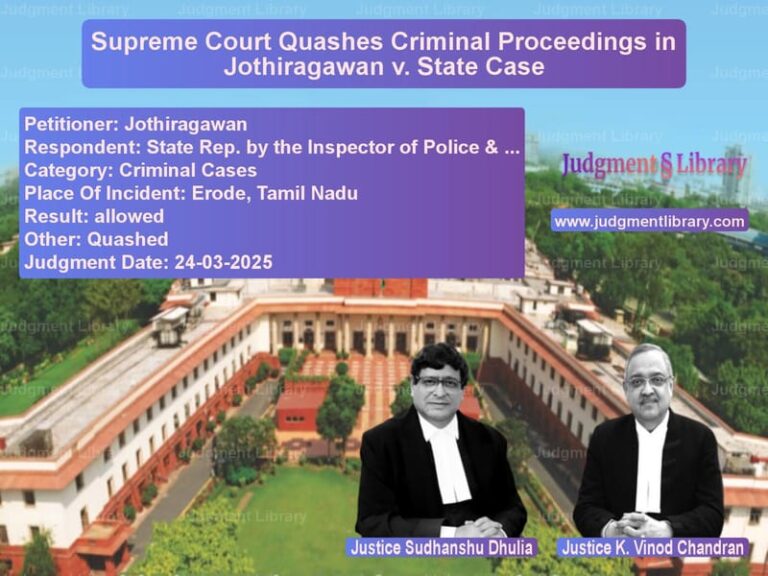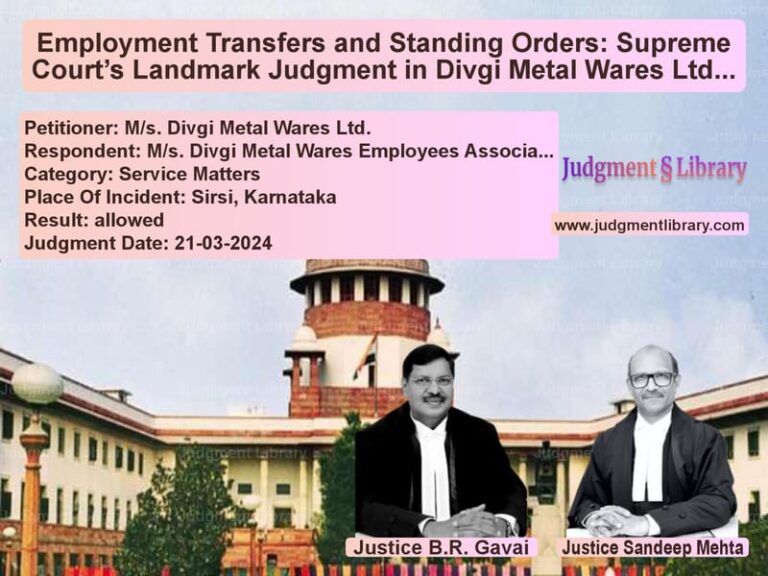Analysis of the Haryana Sikh Gurdwara Management Act, 2014 and Its Constitutional Implications
The Haryana Sikh Gurdwara (Management) Act, 2014, has been the subject of extensive legal scrutiny, particularly regarding its constitutionality and the legislative competence of the State of Haryana to enact such a law. This case explores a series of writ petitions challenging the Act, with a primary focus on the conflict it created with the existing Sikh Gurdwaras Act, 1925, and its implications on the fundamental rights of the Sikh community, especially under Articles 25 and 26 of the Constitution of India. The petitioners argue that the Haryana Act infringes upon the constitutional provisions, while the State of Haryana and the Haryana Sikh Gurdwara Managing Committee defend the Act, asserting the state’s competence to legislate on this matter. The Supreme Court’s judgment sheds light on various legal principles, including the power of the State to legislate on religious matters, the applicability of the 1966 Reorganisation Act, and the scope of the State’s legislative competence.
Background of the Case
The primary contention revolves around the Haryana Sikh Gurdwara (Management) Act, 2014, which created a separate juristic entity to manage Sikh Gurdwaras in Haryana. The Act categorizes Gurdwaras into three schedules based on their income, with different management provisions for each category. The Act was introduced to align the management of Gurdwaras in Haryana with the religious and administrative needs of the Sikh community in the state. However, the petitioners, including Harbhajan Singh and the Shiromani Gurdwara Prabandhak Committee (SGPC), argue that the Act violates fundamental rights guaranteed under Part III of the Constitution, particularly the right to manage religious affairs under Articles 25 and 26. The SGPC also contends that the Haryana Act usurps the control of Gurdwaras from the SGPC, a body that has traditionally managed Sikh Gurdwaras across India.
Read also: https://judgmentlibrary.com/state-of-karnataka-vs-m-a-mohamad-sanaulla-a-land-dispute-case/
Petitioner’s Arguments
Harbhajan Singh, a resident of Haryana and an elected representative of the SGPC, challenges the Haryana Act on multiple grounds:
- Violation of Constitutional Provisions: The petitioner argues that the Haryana Act infringes upon the rights guaranteed by Articles 25 and 26, which protect the freedom to manage religious affairs. The Act, by creating a separate management committee for Haryana’s Gurdwaras, undermines the SGPC’s authority, which has historically managed Sikh Gurdwaras across India.
- Legislative Competence: The petitioner contends that the State of Haryana lacks the legislative competence to enact a law concerning inter-state corporations like the SGPC, which manages Sikh Gurdwaras across multiple states. The Haryana Act, according to the petitioner, encroaches upon the jurisdiction of Parliament, as the SGPC is an inter-state body corporate governed by the 1925 Act.
- Fundamental Rights: The petitioner further argues that the Act violates the fundamental rights of the Sikh community under Article 26 of the Constitution, which guarantees the right to establish and maintain institutions for religious and charitable purposes. The petitioner claims that the Haryana Act disrupts the religious unity of the Sikh community and violates the SGPC’s right to manage Gurdwaras and their properties.
Respondent’s Arguments
The State of Haryana and the Haryana Sikh Gurdwara Managing Committee defend the Haryana Act, asserting that it falls within the state’s legislative competence:
- Legislative Authority: The respondents argue that the Haryana Act was enacted in accordance with the powers vested in the state under Entry 32 of List II of the Seventh Schedule of the Constitution. The respondents contend that the Act is a state law concerning the management of religious institutions within Haryana, and the state has the authority to legislate on this matter.
- State Jurisdiction: The respondents emphasize that the Haryana Act applies only to Gurdwaras located within the territorial jurisdiction of Haryana, and the Act does not affect Gurdwaras outside the state. Therefore, the Act does not conflict with the 1925 Act, which governs the management of Gurdwaras in Punjab and other regions.
- Reorganization of Religious Affairs: The respondents argue that the Haryana Act aligns with the need to address the unique religious and administrative needs of the Sikh community in Haryana, in line with the state’s constitutional duties under Article 26. The Act provides a legal framework for the administration and financial management of Gurdwaras in Haryana, ensuring their proper functioning and alignment with religious beliefs and practices.
The Court’s Reasoning
The Court’s reasoning revolves around several key legal principles:
- Constitutional Interpretation: The Court examines the legislative competence of the Haryana Legislature, considering whether the Haryana Act encroaches upon the powers of Parliament. The Court refers to the 1966 Punjab Reorganization Act and Section 72, which gives the Central Government authority over inter-state corporations like the SGPC. The Court evaluates whether the Haryana Act violates the principle of federalism by creating a separate management structure for Gurdwaras in Haryana.
- Legislative Competence: The Court addresses the issue of whether the Haryana Act falls within the legislative competence of the State Legislature under Entry 32 of List II or Entry 44 of List I. It finds that the Haryana Act does not conflict with the existing law but creates a separate legal entity for the management of Gurdwaras within Haryana’s jurisdiction. The Court considers whether the Act disrupts the unity of the Sikh community and breaches its fundamental rights under Articles 25 and 26.
- Balance of Powers: The Court stresses the importance of balancing state and central powers in managing religious institutions. While the State of Haryana has the right to legislate on matters within its jurisdiction, the Court affirms that such legislation cannot violate the religious rights of the Sikh community or undermine the SGPC’s authority over Gurdwaras.
The Court’s Decision
The Supreme Court ultimately dismisses the writ petitions, upholding the validity of the Haryana Sikh Gurdwara Management Act, 2014. The Court rules that the Haryana Act does not violate the constitutional provisions concerning the fundamental rights of the Sikh community. The Court concludes that the Haryana Legislature has the authority to enact the law, as it pertains to the management of Gurdwaras within the state. The Court also holds that the Act does not interfere with the SGPC’s rights to manage Gurdwaras outside Haryana.
Conclusion
The judgment reaffirms the principle of state autonomy in managing religious institutions within their jurisdiction, while also emphasizing the importance of safeguarding religious rights under the Constitution. The Haryana Sikh Gurdwara Management Act, 2014, is upheld as a valid exercise of the state’s legislative powers, ensuring the proper management of Gurdwaras within Haryana. The decision highlights the Court’s role in interpreting the balance of powers between the state and central governments, especially in matters involving religious affairs and inter-state bodies.
Petitioner Name: Harbhajan Singh.Respondent Name: State of Haryana & Others.Judgment By: Justice Hemant Gupta, Justice Vikram Nath.Place Of Incident: Haryana.Judgment Date: 20-09-2022.
Don’t miss out on the full details! Download the complete judgment in PDF format below and gain valuable insights instantly!
Download Judgment: harbhajan-singh-vs-state-of-haryana-&-o-supreme-court-of-india-judgment-dated-20-09-2022.pdf
Directly Download Judgment: Directly download this Judgment
See all petitions in Contract Disputes
See all petitions in Property Disputes
See all petitions in Damages and Compensation
See all petitions in Environmental Cases
See all petitions in Judgment by Hemant Gupta
See all petitions in Judgment by Vikram Nath
See all petitions in dismissed
See all petitions in supreme court of India judgments September 2022
See all petitions in 2022 judgments
See all posts in Civil Cases Category
See all allowed petitions in Civil Cases Category
See all Dismissed petitions in Civil Cases Category
See all partially allowed petitions in Civil Cases Category







